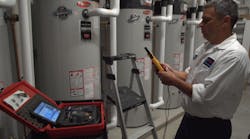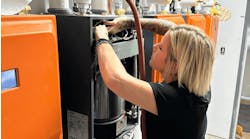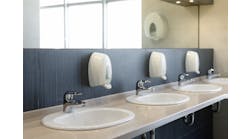Catastrophic water heater failure is one of the worst-case scenarios for facilities management professionals. The possible consequences include water damage, remediation, and the cost of emergency plumbing service along with lost time—and the worst outcome of all is customer frustration and inconvenience.
The good news is that many unexpected water heater breakdowns can be prevented. Planned maintenance and prompt repair services help water heaters last longer and help contractors identify and resolve potential problems before an emergency. A sound investment in routine maintenance allows facilities managers to extend the life of their products and reduce costs over time.
In many cases, if the tank is not leaking, it pays to repair the water heater. If you’re scheduling regular maintenance, using the heater appropriately and it’s within the reasonably expected lifetime of the unit, the modest investment in repairs is usually a better value than incurring the more significant costs of replacement.
Eventually, however, installing a new unit will provide better value than continued upkeep and repair. Continuing to spend money for repairs and maintenance on products that are past their useful life can lead to inefficiency, unnecessary expenditures and increased risk of sudden breakdown.
Facilities management teams aren’t always equipped with the information they need to make the right decision when it comes to continuing to repair a water heater or replacing it, because there is no universal formula for determining the precise moment when replacing a water heater becomes a better value than repair. A range of factors are involved, including the application, maintenance history, and environmental conditions; this is where a plumbing professional can help assess and advise the best course of action to save time and resources.
What’s the best strategy for facilities professionals to make an informed decision that reduces risk and unnecessary expenses at the same time? What should they consider as units age or demonstrate unreliability?
Here are some of the factors water heating experts think about before replacing a water heater:
- Value: Weigh the costs of continued maintenance, repeated repairs and efficiency loss with an aging unit to the installation of an efficient new water heater. Continually sinking small amounts of money into maintenance in order to offset investment in new equipment isn’t necessarily true value.
- Risk: Even with recommended maintenance, older units may present an increased risk of emergency failure. Always keep the potential costs associated with such an event in mind when considering whether to replace or repair a water heater.
- Application: Consider how your facility and user behavior has changed since the water heater was installed. Has demand for hot water increased?
- Regulation: Familiarize yourself with new local, state and federal regulations on energy efficiency in order to ensure full compliance. Guidelines are continually evolving. Rebates and other incentives may be available to make energy-efficient equipment more cost-effective.
Adhering to scheduled maintenance keeps equipment operational, but you should also follow manufacturer recommendations regarding regular visual inspections of parts and machinery as well as the integrity of the tank and scaling of the heat exchanger. Equally important, the application can be reviewed to ensure the water heating equipment is still right for the job. In the commercial market, using the proper equipment for the application is key to achieving optimized performance and maximizing service life.
Of course, facilities experts don’t need to make these difficult decisions on their own. As part of the schedule of regular maintenance service, your trusted plumbing professional can offer guidance. While the ultimate decision is yours, an informed expert assessment and in-person inspection can be an invaluable resource. In addition to keeping equipment in good repair, regular maintenance also allows plumbing professionals to understand the history of the heater as well as develop a feel for your business needs, risk tolerance, and other characteristics that will contribute to the final decision.
Most people know that you have to change the oil, rotate the tires, and replace the filters to maintain the performance and reliability of your vehicle. The same principle applies to water heaters. Like cars, water heaters are used every day and perform at their best when they’re fine-tuned and maintained by an expert.


